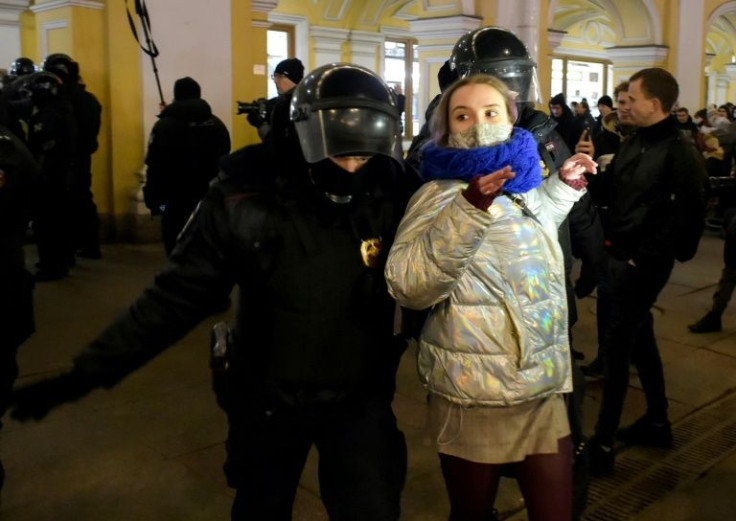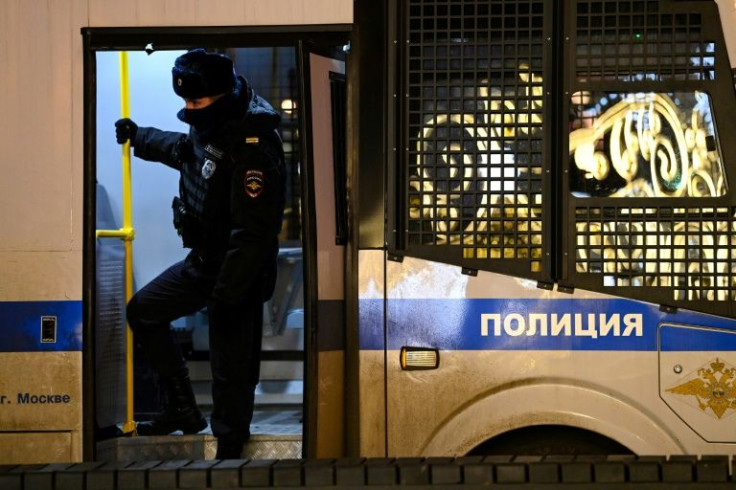Russian Woman Arrested For Posting 'Glory To Ukraine' On WhatsApp; Could Face Jailtime

KEY POINTS
- The Russian woman posted "Glory to Ukraine" in Korean on WhatsApp Wednesday
- The woman faces either a fine or detention of up to 15 days after being charged with a misdemeanor
- A popular Russian singer was recently criticized for responding to a person who shouted "Glory to Ukraine"
A 38-year-old Russian woman in the Russian city of Sochi is facing jail time after she was arrested for posting "Glory to Ukraine" on the social messaging platform WhatsApp.
The woman was charged by police with a misdemeanor after she posted Wednesday a Korean-language status update on her WhatsApp account that translated to "Glory to Ukraine," independent Russian news outlet Meduza reported, citing multiple Russian Telegram channels.
The woman, identified by news outlet Ostorozhno Novosti as Victoria T., is accused of violating Article 20.3 of the Russian criminal code and displaying "Nazi symbolism or symbols of extremist organizations."
The woman faces either a fine or detention of up to 15 days.
The news of the arrest came weeks after Valery Meladze, a popular Russian singer, appeared to show support for Ukraine at a New Year's Eve party in Dubai.
In a video from the party, a person can be heard shouting out the slogan "Glory to Ukraine" to Meladze while the singer was giving a speech.
Meladze can then be seen pulling the microphone away from his face and appearing to mouth the words, "Glory to the heroes," according to a separate Meduza report.
After the video surfaced on social media, the Russian singer, who had condemned the Russian invasion of Ukraine when it began last year, was criticized by some Russian officials.
Yelena Afanasyeva, a senator from the Orenburg region, called for the revocation of Meladze's Russian citizenship, claiming that "some people are allowing themselves to give Nazi salutes with Ukrainian Nazis."
Sergei Mironov, the head of a political party allied with Russian President Vladimir Putin in the Russian State Duma, also condemned Meladze's actions and suggested that all of the awards given to the Russian singer should be revoked.
Russians supporting the war in Ukraine urged the Russian Investigative Committee and the Attorney General's Office to launch an investigation into Meladze and bar him from entering the country.
Data from the Sova Center, a research and information center documenting the human rights situation in Russia, revealed that at least 106 cases of violating Russian law against the displaying of Nazi and extremist propaganda were recorded in 2022.
Some cases involved individuals using the slogan of "Glory to Ukraine."
Putin often used "Nazis" to justify the Russian invasion of Ukraine.
When Putin announced that Russia will launch a "special military operation" against Ukraine a year ago, the Russian president said the offensive aimed to "denazify" the country.
In an interview with the Anti-Defamation League, Dr. David Fishman, a Jewish History professor at the Jewish Theological Seminary, explained that Putin linked Ukrainians with the Nazis as part of his campaign to discredit the Ukrainian government.
"This propaganda is an attempt to delegitimize Ukraine in the eyes of the Russian public, which considers its war against Nazi Germany its greatest moment, and in eyes of the Western public who may not know much about Ukraine except that it's next to Russia," Fishman said.

© Copyright IBTimes 2024. All rights reserved.





















